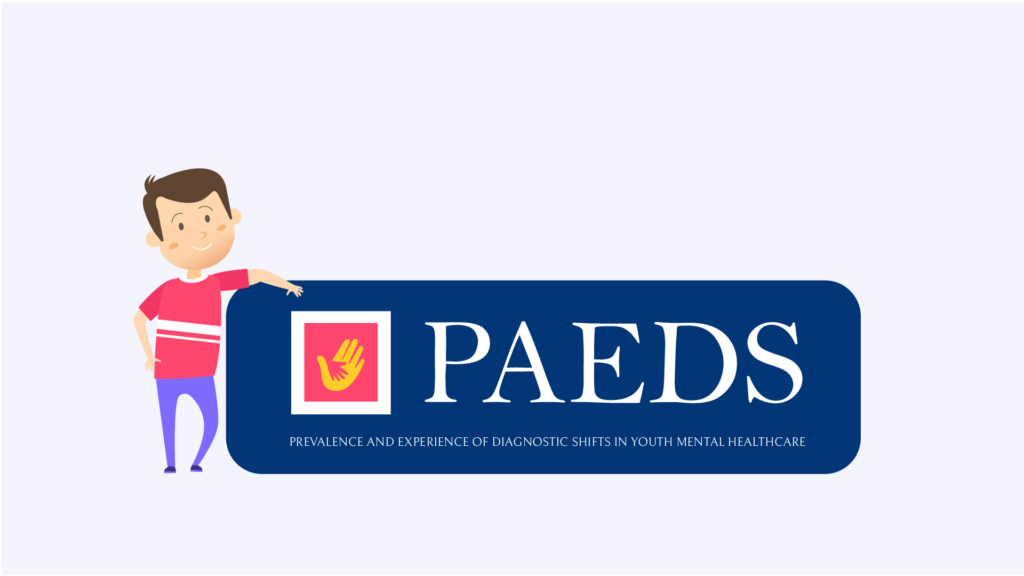Read about some of our selected research projects here.
Prevalence and Experience of Diagnostic Shifts in Youth Mental Healthcare (PAEDS)

Investigators: Dr Cliódhna O’Connor, Prof Fiona McNicholas
Funder: European Commission
Being diagnosed with a neurodevelopmental or mental health disorder can have profound consequences for how young people see themselves and relate to others. For various reasons, some young people may have their original diagnosis changed as they move through mental health services. The PAEDS study set out to explore how frequently these diagnostic shifts happen and their social, emotional and practical repercussions for young people and their families. Results informed the development of free resources to help clinicians, young people and parents communicate and adapt to diagnostic shifts.
Key References:
O’Connor, C., & McNicholas, F. (2020). Lived experiences of diagnostic shifts in child and adolescent mental health contexts: a qualitative interview study with young people and parents. Journal of Abnormal Child Psychology, 48, 979-993. https://doi.org/10.1007/s10802-020-00657-0
O’Connor, C., Downs, J., Shetty, H., & McNicholas, F. (2020). Diagnostic trajectories in child and adolescent mental health services: exploring the prevalence and patterns of diagnostic adjustments in an electronic mental health case register. European Child & Adolescent Psychiatry, 29, 1111-1123. https://doi.org/10.1007/s00787-019-01428-z
O’Connor, C., Kadianaki, I., Maunder, K., & McNicholas, F. (2018). How does psychiatric diagnosis affect young people’s self-concept and social identity? A systematic review and synthesis of the qualitative literature. Social Science & Medicine, 212, 94-119. https://doi.org/10.1016/j.socscimed.2018.07.011
The Brain in the Public Sphere
Investigators: Dr Cliódhna O’Connor, Prof Helene Joffe
Funder: Faraday Institute at St. Edmund’s College, Cambridge
The rising public profile of neuroscience in recent years has prompted questions about its impact on culture and society. This project synthesised diverse evidence to consider the ways neuroscience is invoked in popular media and how lay publics engage with such information. In particular, the project explored how neuroscience may affect common-sense understandings of individuals and social groups, for example by studying how neuroscientific information about sex differences is interpreted in wider society.
Key References:
O’Connor, C.,Rees, G., & Joffe, H. (2012). Neuroscience in the public sphere. Neuron, 74(2), 220-226. https://doi.org/10.1016/j.neuron.2012.04.004
O’Connor, C.,& Joffe, H. (2013). How has neuroscience affected lay understandings of personhood? A review of the evidence. Public Understanding of Science, 22(3), 254-268. https://doi.org/10.1177/0963662513476812
O’Connor, C., & Joffe, H. (2014). Social representations of brain research: Exploring public (dis) engagement with contemporary neuroscience. Science Communication, 36(5), 617-645. https://doi.org/10.1177/1075547014549481
O’Connor, C., & Joffe, H. (2014). Gender on the brain: A case study of science communication in the new media environment. PLOS ONE, 9(10), e110830. https://doi.org/10.1371/journal.pone.0110830
Understanding the Experience of Receiving an Autism Diagnosis in Adulthood
Investigators: Juwayriyah Nayyar, Dr Cliódhna O’Connor
Funder: UCD ADVANCE
Increasing numbers of people are receiving diagnoses of Autism Spectrum Disorder (ASD) as adults, yet very little research has explored how adults experience this process. This PhD project explores the barriers and facilitators to adult ASD assessment, how people make sense of receiving this neurodevelopmental diagnosis in adulthood, and the implications of the diagnosis for people’s lives.